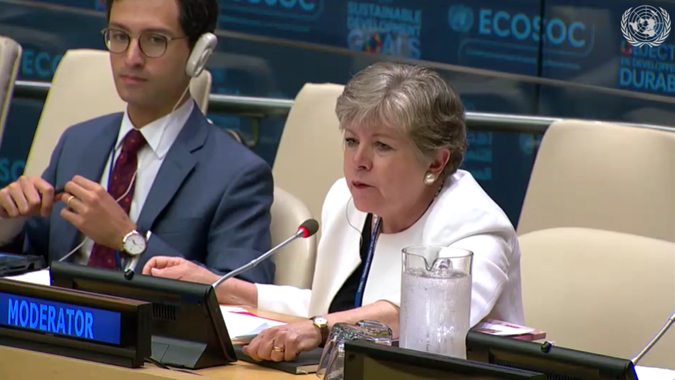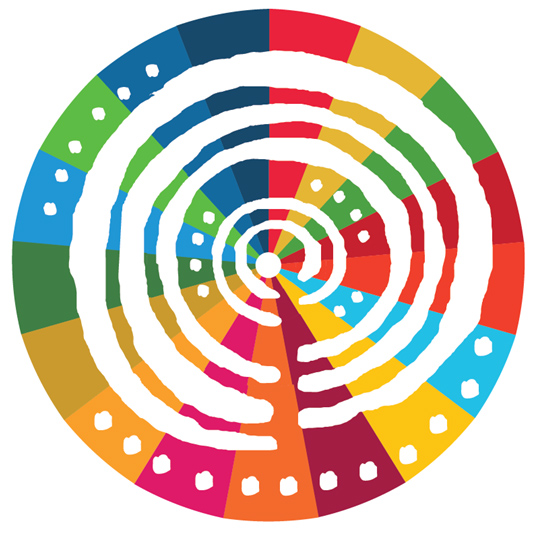Alicia Bárcena: “Active fiscal policies are needed to finance the 2030 Agenda and ensure that no one is left behind”
Work area(s)
On the first day of the High-Level Political Forum on Sustainable Development 2019, ECLAC’s Executive Secretary, speaking on behalf of the five United Nations regional commissions, gave an account of the progress made toward meeting the SDGs and called for putting equality at the center.

Alicia Bárcena, the Executive Secretary of the Economic Commission for Latin America and the Caribbean (ECLAC), pointed out today at United Nations Headquarters in New York that progress toward meeting the Sustainable Development Goals (SDGs) of the 2030 Agenda is limited and mixed in the different regions of the world and their fulfillment is at risk in some.
In her capacity as coordinator of the five UN regional commissions, the senior international official made a presentation on behalf of these regional bodies in the framework of the session on “Progress, gaps and obstacles: are we on track for leaving no one behind?”, part of the first day of the High-Level Political Forum on Sustainable Development 2019 (HLPF). The HLPF, the main world gathering to review the progress made toward meeting the Sustainable Development Goals approved by the international community to promote greater welfare for all peoples, got underway this Tuesday, July 9 and will continue through Friday 19.
The meeting also included distinguished experts and academics from institutions like the Paris School of Economics, the International Monetary Fund (IMF), the Tanzania Data Lab, the International Rescue Committee (IRC) and the United Nations Institute for Training and Research (UNITAR).
According to Bárcena, fulfillment of the SDGs is not completely assured for any region of the world – with particularly concerning results in the Asia-Pacific, Africa and Arab regions – and she underscored that the extreme concentration of wealth and growing inequality are the main problems that must be confronted to achieve greater progress.
“Inequality continues to be an enormous challenge. In Latin America and the Caribbean, we are making progress in the area of income distribution, and some goals have already been met – such as the reduction in maternal mortality – but we have a reversion in terms of employment. In order to ensure a more equitable distribution of income, active fiscal policies are needed to finance the 2030 Agenda for Sustainable Development and thus prevent anyone from being left behind,” underscored Bárcena.
She added that the groups lagging behind the most are indigenous peoples, Afro-descendants, young people and children, and highlighted the importance of gender equality for meeting all the goals. She also said that rural areas are being left behind, mainly in the Island States of the Caribbean, and Haiti in particular.
During her remarks, Alicia Bárcena stressed that gaining more fiscal space will require reducing tax evasion and illicit financial flows derived from the manipulation of the international assets trade; adoption of environmental and health taxes, as well as in the digital economy; rethinking tax expenses to align them with investment results; and strengthening the taxation of income and personal property.
“In order to accomplish this, we at ECLAC propose four public spending and investment policies: protect the double inclusion (social and labor) of persons on a social spending basis; guide public investment toward innovative technologies based on natural resources; foster public-private partnerships to boost infrastructure and renewable energies; and redesign fiscal incentives for industrial policies,” she explained.
With regard to the specific challenges for middle-income countries – thus classified according to their national per capita income and encompassing the majority of the nations of Latin America and the Caribbean – Bárcena said that this criterion of income per capita does not properly reflect the multiple economic and social heterogeneities of these countries.
“In these countries, the ‘graduation’ to high income to which they have been submitted does not mean that they have attained higher levels of wellbeing, since they continue to experience significant economic and environmental vulnerabilities, especially in the small developing island nations in the Caribbean. For this reason, it is imperative that we change the perspective of development: from income per capita to development in transition. This ‘graduation’ means they are excluded from international aid; it must be replaced by development in transition,” explained the ECLAC Executive Secretary.
The day prior to the convening of the HLPF (Monday, July 8), Alicia Bárcena participated in the 2019 Integration Segment of the United Nations Economic and Social Council (ECOSOC), where she moderated a panel on prosperous and pacific societies in the era of the SDGs. On the occasion, the ECLAC senior official insisted that equality must be the engine of growth, given that inequality is inefficient from an economic and social standpoint, and conspires against sustainable development.
“The culture of privilege weakens confidence in institutions. ECLAC estimates that tax evasion in Latin America and the Caribbean reaches some USD 335 billion, or 6.3% of GDP. We could finance the 2030 Agenda with that money!” she emphasized.
During her visit to New York, Bárcena also held meetings with diplomatic representatives at the Mexican Embassy to the United Nations.
Related link(s)
Country(ies)
- Latin America and the Caribbean
Contact
Public Information Unit
- prensa@cepal.org
- (56 2) 2210 2040
